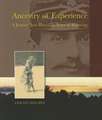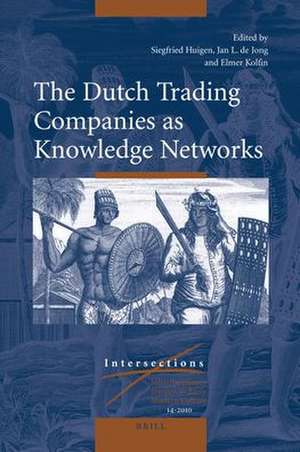The Dutch Trading Companies as Knowledge Networks: Intersections, cartea 14
Siegfried Huigen, Jan L. de Jong, Elmer Kolfinen Limba Engleză Hardback – 17 aug 2010
Contributors include: Paul Arblaster, Hans den Besten, Frans Blom, Britt Dams, Adrien Delmas, Alette Fleischer, Antje Flüchter, Michiel van Groesen, Henk de Groot, Julie Berger Hochstrasser, Grégoire Holtz, Siegfried Huigen, Elspeth Jajdelska, Maria-Theresia Leuker, Edwin van Meerkerk, Bruno Naarden, and Christina Skott.
Din seria Intersections
-
 Preț: 217.51 lei
Preț: 217.51 lei -
 Preț: 174.49 lei
Preț: 174.49 lei -
 Preț: 200.26 lei
Preț: 200.26 lei -
 Preț: 215.61 lei
Preț: 215.61 lei -
 Preț: 98.61 lei
Preț: 98.61 lei -
 Preț: 192.18 lei
Preț: 192.18 lei -
 Preț: 154.86 lei
Preț: 154.86 lei -
 Preț: 116.09 lei
Preț: 116.09 lei - 18%
 Preț: 1074.49 lei
Preț: 1074.49 lei -
 Preț: 241.64 lei
Preț: 241.64 lei -
 Preț: 241.64 lei
Preț: 241.64 lei -
 Preț: 228.96 lei
Preț: 228.96 lei -
 Preț: 229.55 lei
Preț: 229.55 lei -
 Preț: 241.64 lei
Preț: 241.64 lei -
 Preț: 226.67 lei
Preț: 226.67 lei -
 Preț: 107.21 lei
Preț: 107.21 lei -
 Preț: 208.79 lei
Preț: 208.79 lei -
 Preț: 201.78 lei
Preț: 201.78 lei -
 Preț: 226.85 lei
Preț: 226.85 lei -
 Preț: 225.71 lei
Preț: 225.71 lei -
 Preț: 246.63 lei
Preț: 246.63 lei - 47%
 Preț: 319.92 lei
Preț: 319.92 lei - 7%
 Preț: 315.66 lei
Preț: 315.66 lei -
 Preț: 96.10 lei
Preț: 96.10 lei - 18%
 Preț: 1201.75 lei
Preț: 1201.75 lei - 18%
 Preț: 659.69 lei
Preț: 659.69 lei - 18%
 Preț: 693.26 lei
Preț: 693.26 lei - 18%
 Preț: 1049.43 lei
Preț: 1049.43 lei - 18%
 Preț: 698.32 lei
Preț: 698.32 lei - 18%
 Preț: 681.99 lei
Preț: 681.99 lei - 18%
 Preț: 820.59 lei
Preț: 820.59 lei - 18%
 Preț: 683.37 lei
Preț: 683.37 lei - 18%
 Preț: 667.86 lei
Preț: 667.86 lei
Preț: 687.25 lei
Preț vechi: 838.11 lei
-18% Nou
Puncte Express: 1031
Preț estimativ în valută:
131.51€ • 135.88$ • 109.40£
131.51€ • 135.88$ • 109.40£
Carte indisponibilă temporar
Doresc să fiu notificat când acest titlu va fi disponibil:
Se trimite...
Preluare comenzi: 021 569.72.76
Specificații
ISBN-13: 9789004186590
ISBN-10: 900418659X
Pagini: 441
Dimensiuni: 155 x 235 x 30 mm
Greutate: 0.91 kg
Editura: Brill
Colecția Brill
Seria Intersections
ISBN-10: 900418659X
Pagini: 441
Dimensiuni: 155 x 235 x 30 mm
Greutate: 0.91 kg
Editura: Brill
Colecția Brill
Seria Intersections
Notă biografică
Siegfried Huigen is Associate Professor of Dutch Literature and Cultural History at the University of Stellenbosch, in South Africa. His research interests are early modern travel writing and the history of colonial science and scholarship. He is the author of De weg naar Monomotapa (1996) and Knowledge and Colonialism; Eighteenth-Century Travellers in South Africa (2007 and 2009), and (co)editor of several books on South African politics of memory and colonial discourse. He is currently researching eighteenth-century Dutch representations of the ‘East Indies’.
Jan L. de Jong did his Ph.D. at Leiden University and now teaches Italian Renaissance art at the University of Groningen, The Netherlands. He has published numerous articles on Italian painting and has a manuscript on papal propaganda in the Renaissance set for publication. He edited several volumes of Intersections: Interdisciplinary Studies in Early Modern Culture. His current research focuses on reports of visitors to Italy in the sixteenth century.
Elmer Kolfin studied art history and modern western literature at the University of Utrecht. He got his Ph.D. in art history at Leiden University and currently teaches art history at the University of Amsterdam. He publishes mainly on seventeenth century Dutch painting, prints and book illustration. He has initiated and edited a volume on political prints of the Dutch stadtholders (2007) and co-edited the exhibition catalogue Black is Beautiful. Rubens to Dumas, on the representation of blacks in Dutch art.
Jan L. de Jong did his Ph.D. at Leiden University and now teaches Italian Renaissance art at the University of Groningen, The Netherlands. He has published numerous articles on Italian painting and has a manuscript on papal propaganda in the Renaissance set for publication. He edited several volumes of Intersections: Interdisciplinary Studies in Early Modern Culture. His current research focuses on reports of visitors to Italy in the sixteenth century.
Elmer Kolfin studied art history and modern western literature at the University of Utrecht. He got his Ph.D. in art history at Leiden University and currently teaches art history at the University of Amsterdam. He publishes mainly on seventeenth century Dutch painting, prints and book illustration. He has initiated and edited a volume on political prints of the Dutch stadtholders (2007) and co-edited the exhibition catalogue Black is Beautiful. Rubens to Dumas, on the representation of blacks in Dutch art.
Recenzii
"This excellent collection of essays helps to further a powerful new turn in historical studies related to the production of knowledge. [...] As a collected volume, [...] these papers represent the kind of connected global histories that so many people understandably find exciting. [...] Readers will therefore find this volume an indispensable guide to the conflicts and absences, as well as positive achievements, of the knowledge networks associated with the VOC and WIC."
Harold Cook, Brown University. In: The Journal of Modern History, Vol. 84, No. 3 (September 2012), pp. 756-758.
‘’Many scholars of the early modern world will find inspiration here’’.
Martha Chaiklin, University of Pittsburgh. In: Sixteenth Century Journal, Vol. 43, No. 1, (2012), p. 185.
"The Dutch Trading Companies as Knowledge Networks is a fascinating collection of essays that explores the many modes through which various scholars, soldiers, politicians, artists, religious men, and even one woman, made use of the infrastructure of the Dutch trading companies to grow European knowledge of the wider world in myriad ways."
Anne Good, Reinhardt University. In: Itinetario, Vol. 35, No. 2 (August 2011), pp. 106-108.
"The Dutch Trading Companies as Knowledge Networks shows convincingly that both the VOC and WIC functioned as quite efficient systems of information gathering stimulating the accumulation of knowledge, though primarily for reasons of profit and power."
Markus P.M. Vink, State University of New York at Fredonia. In: Journal of Early Modern History, Vol. 15, No. 6 (2011), pp. 587-591.
Harold Cook, Brown University. In: The Journal of Modern History, Vol. 84, No. 3 (September 2012), pp. 756-758.
‘’Many scholars of the early modern world will find inspiration here’’.
Martha Chaiklin, University of Pittsburgh. In: Sixteenth Century Journal, Vol. 43, No. 1, (2012), p. 185.
"The Dutch Trading Companies as Knowledge Networks is a fascinating collection of essays that explores the many modes through which various scholars, soldiers, politicians, artists, religious men, and even one woman, made use of the infrastructure of the Dutch trading companies to grow European knowledge of the wider world in myriad ways."
Anne Good, Reinhardt University. In: Itinetario, Vol. 35, No. 2 (August 2011), pp. 106-108.
"The Dutch Trading Companies as Knowledge Networks shows convincingly that both the VOC and WIC functioned as quite efficient systems of information gathering stimulating the accumulation of knowledge, though primarily for reasons of profit and power."
Markus P.M. Vink, State University of New York at Fredonia. In: Journal of Early Modern History, Vol. 15, No. 6 (2011), pp. 587-591.
Cuprins
Siegfried Huigen, Introduction
The Americas
Britt Dams, ‘Elias Herckmans. A poet at the borders of Dutch Brazil’
Michiel van Groesen, ‘Officers of the West India Company, their networks, and their personal memories of Dutch Brazil’
Julie Hochstrasser, ‘The butterfly effect. Embodied cognition and perceptual knowledge in Maria Sibylla Merian’s Metamorphosis insectorum surinamensium’
Frans Blom, ‘Picturing New Netherland and New York. Dutch-Anglo transfer of new world information’
Asia
Paul Arblaster, ‘Piracy and play: two Catholic appropriations of Nieuhof’s gezantschap’
Maria-Theresa Leuker, ‘Knowledge transfer and cultural appropriation: Georg Everhard Rumphius’s ‘D’amboinsche rariteitkamer’ (1705)’
Siegfried Huigen, ‘Antiquarian Ambonese: François Valentyn’s comparative ethnography (1724)’
Henk de Groot, ‘Engelbert Kaempfer, Imamura Gen’emon and Arai Hakuseki—
An early exchange of knowledge between Japan and the Netherlands’
Bruno Naarden, ‘Witsen’s Studies Of Inner Eurasia’
South Africa
Alette Fleischer, ‘(Ex)changing knowledge and nature at the Cape of Good Hope, circa 1652-1700’
Hans den Besten, ‘A badly harvested field: the growth of linguistic knowledge and the Dutch Cape colony until 1796’
Europe
Adrien Delmas, ‘Writing history in the age of discovery, according to La Popelinière, 16th – 17th centuries’
Grégoire Holtz, ‘The model of the VOC in early seventeenth century France (Hugo Grotius and Pierre Bergeron)’
Antje Flüchter, ‘‘Aus den fürnembsten indianischen Reisebeschreibungen zusammengezogen’. Knowledge about India in Early Modern Germany’
Christina Granroth, ‘The VOC and Swedish natural history: the transmission of scientific knowledge in the eighteenth century’
Elspeth Jajdelska, ‘Unknown unknowns; ignorance of the Indies among late seventeenth-century Scots’
Edwin van Meerkerk, ‘Colonial objects and the display of power. The curious case of the cabinet of William V and the Dutch India Companies’
Index
